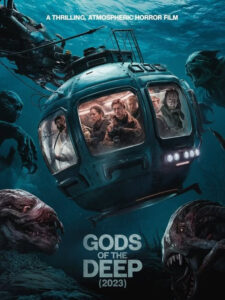
“Gods of the Deep” (2023) is a film that artfully marries the elements of horror, thriller, and mythology to create a cinematic experience that resonates with viewers on multiple levels. At its core, it explores timeless themes of humanity’s insignificance in the face of nature’s unknown and uncontrollable forces, and the perils of uncovering secrets best left undiscovered. Below, I will delve deeper into various aspects of the film, including its themes, characters, cinematography, and overall impact on the horror and thriller genres.
Introduction to the Film
“Gods of the Deep,” directed by Matt Sconce, immerses its audience in the mysterious and terrifying world beneath oceanic depths. From the outset, the film captures our imagination, luring us into a space that is as beautiful as it is dangerous. The plot centers around a team of deep-sea explorers, a collective that embodies a mix of expertise—marine biologists, adventurers, and military personnel—each contributing unique skills and perspectives to the mission at hand.
This eclectic team embarks on a dangerous expedition to investigate a submerged city, a lost civilization that supposedly met its demise due to the wrath of vengeful gods. The film skillfully establishes an atmosphere of suspense and foreboding as the crew grapples with increasingly disturbing occurrences, signifying that something ancient and malevolent is haunting their every move.
Themes Explored in the Film
The Unknown and Human Hubris
One of the central themes of “Gods of the Deep” is humanity’s hubris in the face of nature and the unknown. The deep sea, with its crushing pressures, dark landscapes, and alien creatures, serves as a metaphor for the limits of human understanding and control. As the team delves deeper into the ocean, their initial excitement quickly turns to terror as they encounter supernatural phenomena that defy rational explanation. The film articulates a sense of awareness that the crew’s advanced technology and knowledge pale in comparison to the mysteries of the deep.
Myth and Reality
The intertwining of myth and reality is another critical theme in the film. The explorers initially approach the lore surrounding the submerged city with skepticism, treating it as folklore rather than a credible concern. However, as they unearth relics and artifacts of the ancient civilization, the line between myth and reality blurs. The exploration of this theme invites viewers to reflect on how ancient stories can shape our understanding of the world and question whether some myths hold a kernel of truth based on collective human experience.
Survival and Psychological Strain
“Gods of the Deep” also delves into themes of survival and the psychological strain that comes with facing unimaginable terror. As the crew encounters various threats—both from the environment and the mythological entities they have awakened—their relationships become strained, resulting in paranoia, mistrust, and personal revelations.
The film works meticulously to present each character’s internal struggles, forcing them to confront not just the external dangers that surround them but their own fears and moral dilemmas. The psychological weight of their circumstances creates an atmosphere of tension that escalates throughout the film, making survival a critical focus as both a physical and a mental battle.
Character Development
The characters in “Gods of the Deep” are richly developed, each serving as a reflection of broader themes and contributing to the evolution of the story. The diverse backgrounds of the crew members enable the film to explore various dynamics, both personal and professional.
The Leader
A strong leader typically shapes the trajectory of such group expeditions, and in this film, the captain embodies this archetype. As the crew ventures deeper into the ocean, their faith in the captain is tested, leading to moral dilemmas regarding leadership and accountability. The captain’s arc symbolizes the burden of responsibility and the consequences of decisions made under duress.
The Skeptic
Alongside the charismatic leader, the skeptical scientist character serves as a counterpoint, questioning the crew’s motivations and warning against the potential danger posed by the mysteries of the ocean. Their skepticism is grounded in a rational outlook, highlighting the tension between scientific inquiry and the respect for ancient myths. This character often foreshadows upcoming disasters, serving as the audience’s voice of caution.
The Veteran
The military personnel aboard the submersible bring an additional layer of complexity to the group dynamic. As veterans of deep-sea missions, they embody survival instincts and combat skills, but also carry psychological scars from past experiences. Their journey in the film is not just about confronting external threats; it’s also about grappling with their own traumas and the consequences of their past.
The Newcomer
The inclusion of a rookie or newcomer adds an element of vulnerability and innocence. This character often serves as a lens through which the audience experiences the unfolding horror, providing a relatable perspective amidst the chaos. The evolution of this character throughout the film can serve as a harrowing reminder of how the extraordinary circumstances distort human behavior and perceptions.
Cinematic Techniques
The cinematography and visual storytelling in “Gods of the Deep” play a crucial role in amplifying the film’s atmospheric tension. Matt Sconce employs specific techniques to enhance the sense of dread and the vastness of the oceanic depths.
Underwater Cinematography
Utilizing advanced underwater cinematography techniques, the film contrasts the breathtaking beauty of the ocean with its dark, foreboding aspects. The juxtaposition of light and shadow creates a visual metaphor for the known and the unknown, eliciting both awe and fear. The seamless transitions between serene underwater landscapes and chaotic encounters with marine life heighten the emotional impact on the audience.
Sound Design
Sound design is another critical tool the film utilizes to build suspense and immerse viewers in the underwater world. The creaking of the submersible, the eerie silence of the deep, and the unsettling sounds of mysterious creatures all contribute to the tension. This careful orchestration of sound compels the audience to feel the growing unease and heightens the stakes as the crew confronts the unknown.
Special Effects
“Gods of the Deep” incorporates state-of-the-art special effects to bring mythical beings and aquatic horrors to life. The visual representations of the “gods” embody the darkness and terror associated with the legends, rendering them both fascinating and frightful. The careful design of these creatures captures the imagination, creating an immersive experience that makes the audience question what lies beneath the surface.
Impact on the Genre
“Gods of the Deep” has significant implications for the horror-thriller genre, particularly in how it taps into primal fears of the ocean. The film revitalizes common themes found in earlier works while providing a fresh perspective on mythological narratives and survival horror.
Subversion of Traditional Horror Tropes
Rather than relying solely on jump scares or gore, “Gods of the Deep” opts for a psychological approach, blending elements of existential dread with supernatural horror. By focusing on the internal struggles of the characters and their interactions with unknown entities, the film elevates its narrative, inviting viewers to engage with deeper questions about fear and survival.
Reimagining Mythology
The film also contributes to the reimagining of mythology in contemporary cinema. As older stories are retold with modern characters and settings, “Gods of the Deep” acknowledges the power of ancient legends and their relevance to human experiences today. This approach encourages audiences to reconsider their understanding of myths and the lessons they might hold.
Conclusion
In essence, “Gods of the Deep” stands as a compelling horror-thriller that skillfully navigates the combination of suspense, survival, and ancient myth. Through its evocative storytelling, richly developed characters, and immersive cinematography, the film boldly confronts the dark secrets that lie beneath the ocean’s surface. As viewers are taken on a terrifying journey into the depths, they are left to ponder not only the horrors of the deep sea but also the broader themes of human arrogance, the complexities of survival, and the enduring power of myth. “Gods of the Deep” is a film that will linger in the minds of its audience long after the credits roll, making it a memorable contribution to the genre that deserves recognition and discussion.

